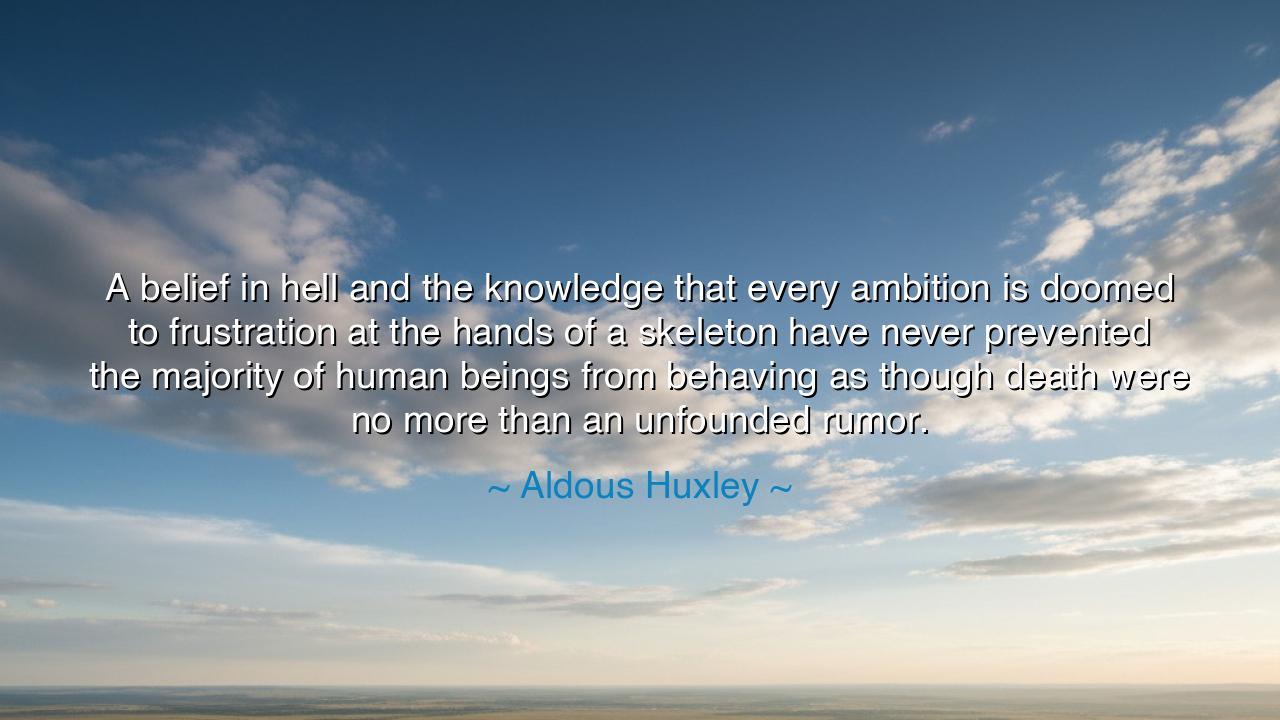
A belief in hell and the knowledge that every ambition is doomed
A belief in hell and the knowledge that every ambition is doomed to frustration at the hands of a skeleton have never prevented the majority of human beings from behaving as though death were no more than an unfounded rumor.






"A belief in hell and the knowledge that every ambition is doomed to frustration at the hands of a skeleton have never prevented the majority of human beings from behaving as though death were no more than an unfounded rumor." Thus wrote Aldous Huxley, the philosopher of paradox, whose mind was both a mirror and a torch for the human condition. In these haunting words, Huxley reflects on the defiance and blindness of mankind—how even when faced with the certainty of death, we persist in living as though eternity were promised to us. His tone is not one of scorn, but of wonder, at the strange courage and folly of the human spirit: a race that knows it must perish, yet acts as though it were immortal.
Huxley, born into an age torn between science and faith, sought to understand the strange duality of human nature. He saw that despite the teachings of religion, which warn of hell and judgment, and the revelations of reason, which promise only decay and dissolution, mankind continues to chase dreams, build monuments, and strive for greatness. It is as if we have conspired to ignore the grim certainty of our end. In this contradiction—knowing we must die, yet living as though we shall not—Huxley found both tragedy and beauty. He recognized that this denial is not mere ignorance, but perhaps the secret engine of civilization itself.
For what would life be if we were always mindful of its brevity? Would art still be painted, cities still be raised, lovers still pledge forever if each heart were burdened by the thought of its final silence? Huxley’s “skeleton”—that ever-present emblem of mortality—haunts every ambition. And yet, he observes, it has never stopped us from striving. This, he suggests, is both our blindness and our greatness. We act as though death were “an unfounded rumor,” because to live fully requires a kind of divine forgetfulness. The human soul cannot create under the constant weight of its doom; it must believe, at least for a while, that tomorrow belongs to it.
Consider the builders of the Great Pyramids. Each one of those laborers knew he would never see the monument completed, yet he carved his stone as though he were immortal. The kings for whom they built believed themselves gods, and though they too turned to dust, their tombs endure thousands of years after their deaths. Was it foolishness that drove them, or faith? Perhaps both. In that contradiction—between the certainty of death and the persistence of creation—lies the essence of humanity. Even as time consumes all, we defy it by making, by dreaming, by loving. We live as though death is far away, though it stands always beside us.
Huxley’s words also reflect his deep meditation on the limits of human reason. He understood that intellect alone cannot reconcile us with mortality. The fear of hell, the awareness of the grave, and the logic of decay all whisper that life is fleeting and ambition vain—yet the heart refuses to listen. It is as though a higher instinct moves within us, one that transcends reason: the instinct to hope, to reach for meaning beyond what we can see. Even in despair, the human being seeks light. Thus, our denial of death is not cowardice—it is a form of spiritual rebellion, the soul’s refusal to believe that it was made only for oblivion.
There is both warning and wisdom in this. To live as though death were a rumor can lead to arrogance and waste—to lives spent chasing vanity, as if time were endless. But it can also lead to greatness—to courage, to love, to the passionate pursuit of beauty. The key, Huxley implies, is balance: to remember death without being crushed by it, to live fully while knowing life is brief. Those who forget mortality become reckless; those who obsess over it become paralyzed. The wise walk the middle path—grateful for each day, fearless in purpose, aware that the flame will one day fade, but determined to burn brightly while it lasts.
So, my listener, take heed of this paradox. Do not deny death, but do not be ruled by it. Let the knowledge of your mortality sharpen your appreciation of life, rather than dim it. When you create, when you love, when you strive—do so knowing it will one day pass. That awareness will not weaken you; it will make your moments sacred. For the brevity of life is not its curse—it is its meaning. The skeleton that waits at the end of all ambition is not your enemy, but your teacher, reminding you to live before you die.
And when you look upon the world—its wars, its triumphs, its art and folly—remember the strange truth Huxley unveiled: that even in the shadow of death, humanity dares to sing, to build, to dream. This is our defiance and our glory. The rumor of death may be true, but so is the miracle of life—and it is the latter that makes us divine.






AAdministratorAdministrator
Welcome, honored guests. Please leave a comment, we will respond soon